In an intriguing move, Tesla has signaled its intentions to revisit Elon Musk’s controversial 2018 remuneration scheme, initially valued at $55.8 billion. This announcement comes after a Delaware Court decision that challenged the legality of the original agreement. Under the terms of this package, Musk, who has declined a salary, could earn the staggering sum through achieving specified performance milestones, a structure the company and some investors deem justifiable given his substantial contributions to Tesla’s growth.
The previous instances of shareholder votes on executive pay highlight a broader trend within corporate governance, focusing on aligning compensation with performance. While Tesla proposes a rerun of the voting process, this scenario underscores the evolving dynamics in executive remuneration, as companies seek to balance fairness with incentives for high-level achievement. The outcome of such votes not only reflects shareholder sentiment but also sets precedents in corporate compensation practices, particularly for high-profile CEOs in technology and innovation-driven industries.
Background of the Legal Challenge
The legal contention surrounding Musk’s pay package emerged when a Delaware Judge deemed the sum extraordinarily large, prompting a review of its fairness and legality. According to Tesla’s board, led by Robyn Denholm, the court’s decision doesn’t align with their understanding of corporate law, thus advocating for a new shareholder vote to legitimize Musk’s compensation based on his performance and commitment to the company.
Shareholder Perspectives and Corporate Stakes
Tesla shareholders are divided, with some arguing that Musk’s achievements, which significantly enhanced company value, justify the substantial package. On the other hand, critics view the amount as excessively generous. The impending vote throws a spotlight on shareholder rights and raises questions about the power dynamics between a company’s executive management and its investors.
Insights from Similar Cases
Exploring other cases, such as Apple and Amazon, where CEO compensation has also sparked debate, provides further context. For instance, articles from Bloomberg and Forbes discuss how these companies handle executive pay and shareholder reactions. These cases, like Tesla’s, illustrate the tightrope of setting CEO compensation that rewards success without alienating shareholders who are mindful of fiscal prudence.
Useful information
- Robyn Denholm leads Tesla’s board in reevaluating Musk’s pay.
- Musk’s compensation connects directly to Tesla’s performance milestones.
- Shareholders’ upcoming vote is crucial for future corporate governance norms.
The reevaluation and subsequent voting on Elon Musk’s pay package could influence future corporate governance frameworks, especially concerning executive compensation in technology firms. This episode not only highlights the challenges in structuring CEO remuneration that is perceived as fair but also emphasizes the importance of shareholder engagement in corporate decisions. Moving forward, Tesla’s approach could serve as a case study for other corporations wrestling with similar issues, providing key lessons in balancing incentive with oversight.










